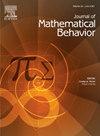Using test cases to refute incorrect existentially quantified propositions: An exploratory study
IF 1.7
Q3 EDUCATION & EDUCATIONAL RESEARCH
引用次数: 0
Abstract
Towards the goal of extending the applicability of test cases to the context of existentially quantified propositions, the present study explores how test cases might support learners with refuting their incorrect existentially quantified propositions. We present and analyze data from two separate instances in which two in-service primary school teachers initially made incorrect existentially quantified propositions and then were asked to find a valid example of their respective propositions (i.e., an element of the subject that satisfies the predicate). The participants were given, and sometimes generated their own, test cases which led to an iterative process of ruling out potential examples and classes of potential examples. Our analysis of this iterative process as it emerged within our specific research setting, comprising among aspects, particular researcher-participant interactions, sheds light on how these test cases afford and support the development and refinement of the learners’ respective existentially quantified propositions.
用测试用例驳斥不正确的存在量化命题:一项探索性研究
为了将测试用例的适用性扩展到存在量化命题的语境中,本研究探讨了测试用例如何支持学习者反驳他们错误的存在量化命题。我们提出并分析了来自两个独立实例的数据,其中两个在职小学教师最初提出了不正确的存在量化命题,然后被要求找到他们各自命题的有效例子(即,满足谓词的主语元素)。参与者被给予,有时生成他们自己的测试用例,这导致了一个排除潜在示例和潜在示例类别的迭代过程。我们对这个迭代过程的分析,因为它出现在我们特定的研究环境中,包括各个方面,特定的研究人员-参与者互动,揭示了这些测试用例如何提供和支持学习者各自存在量化命题的发展和完善。
本文章由计算机程序翻译,如有差异,请以英文原文为准。
求助全文
约1分钟内获得全文
求助全文
来源期刊

Journal of Mathematical Behavior
EDUCATION & EDUCATIONAL RESEARCH-
CiteScore
2.70
自引率
17.60%
发文量
69
期刊介绍:
The Journal of Mathematical Behavior solicits original research on the learning and teaching of mathematics. We are interested especially in basic research, research that aims to clarify, in detail and depth, how mathematical ideas develop in learners. Over three decades, our experience confirms a founding premise of this journal: that mathematical thinking, hence mathematics learning as a social enterprise, is special. It is special because mathematics is special, both logically and psychologically. Logically, through the way that mathematical ideas and methods have been built, refined and organized for centuries across a range of cultures; and psychologically, through the variety of ways people today, in many walks of life, make sense of mathematics, develop it, make it their own.
 求助内容:
求助内容: 应助结果提醒方式:
应助结果提醒方式:


